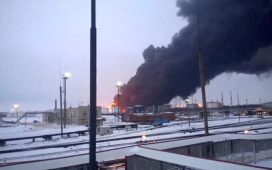TRAIL ON TRIAL: The Supreme Court on Monday heard arguments in a high-profile case that could block construction of an $8 billion gas pipeline seeking to cross the Appalachian Trail.
The proposed Atlantic Coast Pipeline (ACP) would carry natural gas 604 miles from West Virginia to North Carolina and would tunnel below the famed trail that runs more than 2,000 miles from Georgia to Maine.
At issue is whether jurisdiction over the affected land belongs to the U.S. Forest Service or the National Park Service (NPS). The case presents the justices with a complex tangle of federal laws that will determine if the land is open to energy development or must be preserved for recreational use under the park service’s mandate.
The Forest Service issued a permit that would allow the pipeline to cross the trail, but that decision was challenged in the courts by a number of environmental groups. They argue that because the National Park Service oversees all of the federal lands that make up the trail, other agencies don’t have authority to issue a permit. And because the park service’s mandate is focused on conservation, only an act of Congress could allow the pipeline to cross the trail.
The 4th Circuit Court of Appeals agreed, revoking the Forest Service permit.
The government and the Atlantic Coast Pipeline — on the same side in this case — appealed the decision to the high court. The federal government’s lawyer on Monday argued that the Forest Service had the right to issue a permit.
“If a tree falls on the trail, the Forest Service comes to remove the tree. You don’t call the nine National Park Service employees in Harper’s Ferry, West Virginia,” argued Anthony Yang with the Office of the Solicitor General, referring to one of the main park service outposts along the trail.
In the lower court, lawyers for the Southern Environmental Law Center (SELC) argued the permit to cross the Appalachian Trail was only secured due to a change in administration, the first in the trail’s roughly 50-year history. That permit, they argued, threatened pipeline construction over steep and sensitive terrain before tunneling 600 feet below the trail, creating a “scar” on the landscape.
“ACP developers should be playing by the rules, but instead they used political pressure to push a risky project through that, in the end, would harm our public lands,” SELC lawyer DJ Gerken said in a press conference after the hearing.
The Atlantic Coast Pipeline is already tied up in a number of other legal challenges and lacks several other required permits, but the Supreme Court case could determine the fate not only of this pipeline, but others that seek to cross Appalachia.
In a 2018 decision, the U.S. Court of Appeals for the 4th Circuit sided with the environmental activists based on its interpretations of several interconnected federal laws.
The court determined that a 1968 statute called the National Trails Act transferred control over the Appalachian Trail to the National Park Service. And a separate law, the Mineral Leasing Act, prevents the NPS from granting land access, known as a right-of-way, for energy development.
But lawyers advocating for the pipeline construction say the lower court misread the law. They argue the National Trails Act did not wrest control of the Appalachian Trail from the Forest Service, which, unlike the NPS, does have the power to grant rights-of-way.
Justices expressed concerns about the implications of drawing lines between the overlapping authority of two agencies on state and city rights, as well as the future of American energy development.
They questioned if siding with environmental groups could lead the Appalachian Trail to become a sort of Great Wall, blocking pipelines moving from West to East.
Chief Justice John Roberts asked whether siding with environmentalists would lead to a sort of “impermeable barrier” blocking resources in the West from areas to the East with need for them.
“Absolutely incorrect,” Michael Kellog, who represented the environmental groups before the Supreme Court, told Roberts.
Kellog argued that wasn’t a concern because pipelines and other infrastructure could continue to cross through the private and state lands that already are home to roughly 35 pipelines. Another 19 were approved on federal lands before they were designated as part of the trail.
“In the past 50 years, since the Trails Act was passed, there has not been a single new pipeline right-of-way through federal lands under the Appalachian Trail. There have been a number on state, local, and private lands,” he added.
Read more about the hearing here.
IT’S MONDAY! Welcome to Overnight Energy, The Hill’s roundup of the latest energy and environment news. Please send tips and comments to Rebecca Besitsch at rbeitsch@thehill.com. Follow her on Twitter: @rebeccabeitsch. Reach Rachel Frazin at rfrazin@thehill.com or follow her on Twitter: @RachelFrazin.
CATASTROPHIC CLIMATE CHANGE: National security and intelligence experts warn that climate change could become a “catastrophic” threat to security and recommended quick action to be taken to mitigate risks, according to a new report released Monday.
“Even at scenarios of low warming, each region of the world will face severe risks to national and global security in the next three decades,” experts wrote in the report released by the National Security, Military and Intelligence Panel of the Center of Climate and Security, a nonpartisan security policy institute.
“Higher levels of warming will pose catastrophic, and likely irreversible, global security risks over the course of the 21st century.”
The security threat assessment of global climate change warns that all levels of warming of climate change will pose “significant and evolving threats” to global security environments, infrastructure and institutions.
The most fragile parts of the world are most at risk, but all regions face “serious implications,” and high warming scenarios could bring “catastrophic security impacts across the globe,” experts said in the report.
“These threats could come about rapidly, destabilizing the regions and relationships on which U.S. and international security depend,” the experts found, according to the report.
The report said mitigating risks requires “quickly reducing and phasing out global greenhouse gas emissions” and calls for the world to reach net-zero global emissions “as soon as possible.”
The experts also recommend the world “climate-proof” environments and infrastructures human security depends on. They also call for “renewed efforts to prioritize, communicate and respond to climate security threats, and to integrate these considerations across all security planning,” in the U.S.
Read more about the report here.
NOW THAT YOU MENTION IT: A statement from the Group of 20 (G-20) meeting of finance ministers in Saudi Arabia mentions climate change, despite reported resistance from the U.S. on including the language.
“The [Financial Stability Board] is examining the financial stability implications of climate change,” said the communiqué.
It was reported over the weekend that the United States had opposed including language about climate change.
“Climate is the last sticking point in the communique. There is still no agreement,” a different source familiar with the negotiations had told Reuters.
One G-20 diplomat said the opposition had typically come from China in addition to the United States, but at this meeting it was mainly the U.S., as China was represented at a lower level.
French Finance Minister Bruno Le Maire also told The New York Times that he and U.S. Treasury Secretary Steven Mnuchin
“I think he clearly understands that even if we do not share the exactly the same assessment on climate change, there is a need to address the issue within the G7 and within the G20,” Le Maire said. “I think that we have a totally different perspective on the risk of climate change — for us, this is clearly one of the major risks. This is a financial risk.”
Mnuchin described the climate change inclusion as “merely” referring to work already being done by the Financial Stability Board, according to the newspaper.
The communiqué also acknowledges that the “global landscape that is being rapidly transformed by economic, social, environmental, technological and demographic changes.”
Read more about the summit here.
ON TAP TOMORROW:
The Senate Energy and Natural Resources committee will review the Forest Service budget.
The White House Council on Environmental Quality will hold a hearing on its proposed changes to the National Environmental Policy Act.
The Democratic presidential candidates will hold their third debate this month
OUTSIDE THE BELTWAY:
Moab’s Slickrock Trail spared from energy leasing as BLM withdraws plans, The Salt Lake Tribune reports
Study: Rising temperatures are taking a worsening toll on the Colorado River, The Arizona Republic reports
Revamped lead rule ignores concerns raised in EPA memo, E&E News reports
Wyoming Governor Lauds Halt to Planned Aerial Gunning of Mountain Goats in Grand Teton, K2 Radio reports
ICYMI: Stories from Monday and over the weekend…
Justices grapple with $8 billion pipeline that would cross Appalachian Trail
Climate change gets mention in G-20 statement
Report warns climate change could become ‘catastrophic‘ global, national security threat
Trump Jr. granted permit to hunt grizzly bear in Alaska: report
FROM THE HILL’S OPINION PAGES:
New trends bolster chance of successful deployment of carbon capture and storage, argues Lee Beck, a Women Leaders in Energy fellow at the Atlantic Council’s Global Energy Center.








